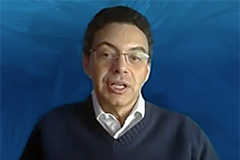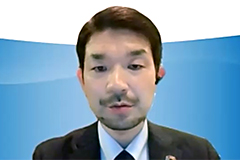Aiming for Social Transformation Focusing on the Sustainability of Our Planet by Individuals’ Choices: Discussion at the Human Development Report 2020 Launch Event
2021.03.25
On Feb. 5, 2021, the United Nations Development Programme (UNDP) held an online launch event for the 2020 Human Development Report (HDR 2020), "The next frontier: Human Development and the Anthropocene," which was published in December 2020.
Director Yoshida Aya of the Global Issues Cooperation Division, International Cooperation Bureau, Ministry of Foreign Affairs of Japan, started the event with opening remarks. She pointed out the importance of societal changes to maintain the sustainability of our planet and the need for a mechanism to encourage actions toward the societal changes based on choices by governments, corporates, civil society, academia and each individual, as described in the HDR 2020.
Next, Pedro Conceição, the director of the Human Development Report Office of UNDP gave a keynote speech on the key message of the HDR 2020, the 30th anniversary edition of the annual HDRs. The following is a summary of the keynote: As seen in many women pulling back from labor market and going through economic hardships because of the COVID-19 pandemic, we are not only facing growing inequality but new types of risks are actually even further exacerbating inequalities. Under such circumstances, we must redefine the goals of human development. Conventional human development aimed to provide more choices for people to choose from, but because of the pressures that we are putting on our planet, we are starting to have fewer choices available. Therefore, the HDR 2020 not only published the traditional Human Development Index, which measures health, education and living standards in each country, but also the planetary pressures–adjusted Human Development Index (PHDI), which takes material footprint per capita (i.e., the attribution of global material extraction to domestic final demand of a country) and carbon dioxide emissions per capita into account. The PHDI can illustrate changes in the outlook of global development when the health of not only human beings but also of our planet is incorporated in the core standards for defining our progress. Advancing human development is not just about aiming to improve human wellbeing: it is also about seeing the people as the agents of innovation and creating conditions that allow people to make different choices.

Pedro Conceição, the director of the Human Development Report Office of UNDP gave a keynote speech
Furthermore, Conceição pointed out three mechanisms for changes that would be necessary from here: first, one that changes people’s behaviors by harnessing social norms; second, one that changes people’s behaviors through incentives and investments for research, technologies and innovations, and regulations; and a third one that advances nature-based human development (e.g., protection and restoration of ecosystems). Conceição emphasized that the HDR 2020 would serve as a signpost to continue pursuing human development, while easing pressures on the planet.
In the following session, moderated by Kondo Tetsuo, the director of the UNDP Representation Office in Tokyo, Murotani Ryutaro, the senior director and head of the Office of Peacebuilding, Governance and Peacebuilding Department, JICA, participated as a discussant. Murotani commended the HDR 2020 for how it linked the COVID-19 crisis with climate change by calling for social transformation to a new normal. He said just like COVID-19 is pushing us to a shift toward a new normal, climate change is also encouraging social transformation. He also commented that although both human development and human security are human-centric concepts, they are at the same time planet-friendly concepts, and that the HDR 2020 shows how these seemingly contradicting ideas can be balanced. Moreover, after introducing a background paper for the HDR 2020 by the researchers of the JICA Ogata Sadako Research Institute for Peace and Development (JICA Ogata Research Institute), namely Oscar A. Gómez, visiting fellow; Hanatani Atsushi, research fellow; Makimoto Saeda, principal research fellow; and Muto Ako, executive senior research fellow, and Murotani himself, he emphasized that human development and human security complement each other, as human development looks at how human potential and capacity can be expanded, while human security looks at how to prevent and deal with threats and potential crises.

Murotani Ryutaro, the senior director and head of the Office of Peacebuilding, Governance and Peacebuilding Department, JICA, participated as a discussant
Finally, Muto Megumi, vice president of JICA and former deputy director of JICA Ogata Research Institute, gave closing remarks. She mentioned that constructive dialogue between researchers studying human security and those studying the planet's sustainability was yet to be seen, but the HDR 2020 creates a positive and timely momentum for the purpose. She also underscored that the integrated framework enables us all to focus on behavioral change as the common denominator to look forward. She concluded by expressing her expectations for active discussions that result in real actions.

事業事前評価表(地球規模課題対応国際科学技術協力(SATREPS)).国際協力機構 地球環境部 . 防災第一チーム. 1.案件名.国 名: フィリピン共和国.

事業事前評価表(地球規模課題対応国際科学技術協力(SATREPS)).国際協力機構 地球環境部 . 防災第一チーム. 1.案件名.国 名: フィリピン共和国.

事業事前評価表(地球規模課題対応国際科学技術協力(SATREPS)).国際協力機構 地球環境部 . 防災第一チーム. 1.案件名.国 名: フィリピン共和国.

事業事前評価表(地球規模課題対応国際科学技術協力(SATREPS)).国際協力機構 地球環境部 . 防災第一チーム. 1.案件名.国 名: フィリピン共和国.

事業事前評価表(地球規模課題対応国際科学技術協力(SATREPS)).国際協力機構 地球環境部 . 防災第一チーム. 1.案件名.国 名: フィリピン共和国.
scroll